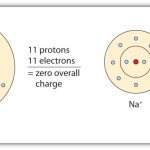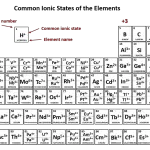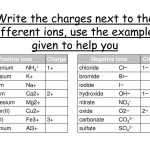Last Updated on 1 year by Francis
We are constantly surrounded by ions and they are an integral part of our life. Did you know that our body contains several important ions? In this article, we will explore the four most common ions found in our body and why they are so important. We will discover which ions are the most common and how they are involved in the functioning of the body. So let’s dive in and learn more about these fascinating ions!
The four most common ions in our body are sodium, potassium, calcium, and chloride. Sodium is found in extracellular fluids, potassium is found inside of cells, calcium is found in bones and teeth, and chloride is found in both intracellular and extracellular fluids. Each of these ions has different roles in the body, including helping to regulate nerve and muscle function, pH balance, and water balance.

Contents
Introduction to Common Ions in the Human Body
Ions are electrically charged particles that are present in the human body. They are essential for the proper functioning of the body, and play a key role in regulating many physiological processes. There are a variety of different ions present in the human body, but some are more common than others. In this article, we will discuss the four most common ions found in the human body.
Sodium Ions
Sodium ions are the most abundant ions in the human body. They are found in the blood, urine, and other bodily fluids. Sodium is an important electrolyte, and is necessary for the proper functioning of cells. It helps to maintain the balance of fluids in the body, and is also involved in nerve conduction, muscle contraction, and other important bodily processes.
Sodium ions are present in the body in a variety of forms, including sodium chloride (NaCl), sodium bicarbonate (NaHCO3), and sodium citrate (NaCit). These ions are necessary for the proper functioning of the body, and are important for regulating blood pressure, fluid balance, and other physiological processes.
Sources of Sodium Ions
Sodium ions are found in a variety of foods, including fruits, vegetables, dairy products, and processed meats. The daily recommended intake of sodium is around 2,300 milligrams, and it is important to maintain this level in order to keep the body functioning properly. Too much sodium can lead to high blood pressure and other health problems.
Salt is also a common source of sodium ions. It is important to limit salt intake in order to keep the body healthy.
Effects of Sodium Ions
Sodium ions are important for the proper functioning of the body. They help to regulate blood pressure, fluid balance, and other physiological processes. However, too much sodium can lead to high blood pressure, heart problems, and other health issues.
It is important to maintain a healthy level of sodium in the body in order to keep the body functioning properly. Eating a balanced diet and limiting salt intake can help to keep sodium levels in check.
Potassium Ions
Potassium ions are the second most abundant ions in the human body. They are found in the blood, urine, and other bodily fluids. Potassium is an important electrolyte, and is necessary for the proper functioning of cells. It helps to maintain the balance of fluids in the body, and is also involved in nerve conduction, muscle contraction, and other important bodily processes.
Potassium ions are present in the body in a variety of forms, including potassium chloride (KCl), potassium bicarbonate (KHCO3), and potassium citrate (KCit). These ions are necessary for the proper functioning of the body, and are important for regulating blood pressure, fluid balance, and other physiological processes.
Sources of Potassium Ions
Potassium ions are found in a variety of foods, including fruits, vegetables, dairy products, and processed meats. The daily recommended intake of potassium is around 4,700 milligrams, and it is important to maintain this level in order to keep the body functioning properly. Too little potassium can lead to low blood pressure and other health problems.
Salt is also a common source of potassium ions. It is important to limit salt intake in order to keep the body healthy.
Effects of Potassium Ions
Potassium ions are important for the proper functioning of the body. They help to regulate blood pressure, fluid balance, and other physiological processes. Too little potassium can lead to low blood pressure, heart problems, and other health issues.
It is important to maintain a healthy level of potassium in the body in order to keep the body functioning properly. Eating a balanced diet and limiting salt intake can help to keep potassium levels in check.
Calcium Ions
Calcium ions are the third most abundant ions in the human body. They are found in the blood, urine, and other bodily fluids. Calcium is an important electrolyte, and is necessary for the proper functioning of cells. It helps to maintain the balance of fluids in the body, and is also involved in bone development, muscle contraction, and other important bodily processes.
Calcium ions are present in the body in a variety of forms, including calcium chloride (CaCl2), calcium carbonate (CaCO3), and calcium citrate (CaCit). These ions are necessary for the proper functioning of the body, and are important for regulating blood pressure, fluid balance, and other physiological processes.
Sources of Calcium Ions
Calcium ions are found in a variety of foods, including dairy products, green leafy vegetables, and fish. The daily recommended intake of calcium is around 1,000-1,200 milligrams, and it is important to maintain this level in order to keep the body functioning properly. Too little calcium can lead to weak bones and other health problems.
Salt is also a common source of calcium ions. It is important to limit salt intake in order to keep the body healthy.
Effects of Calcium Ions
Calcium ions are important for the proper functioning of the body. They help to regulate blood pressure, fluid balance, and other physiological processes. Too little calcium can lead to weak bones, heart problems, and other health issues.
It is important to maintain a healthy level of calcium in the body in order to keep the body functioning properly. Eating a balanced diet and limiting salt intake can help to keep calcium levels in check.
Chloride Ions
Chloride ions are the fourth most abundant ions in the human body. They are found in the blood, urine, and other bodily fluids. Chloride is an important electrolyte, and is necessary for the proper functioning of cells. It helps to maintain the balance of fluids in the body, and is also involved in nerve conduction, muscle contraction, and other important bodily processes.
Chloride ions are present in the body in a variety of forms, including chloride chloride (ClCl2), chloride bicarbonate (ClHCO3), and chloride citrate (ClCit). These ions are necessary for the proper functioning of the body, and are important for regulating blood pressure, fluid balance, and other physiological processes.
Sources of Chloride Ions
Chloride ions are found in a variety of foods, including fruits, vegetables, dairy products, and processed meats. The daily recommended intake of chloride is around 2,300 milligrams, and it is important to maintain this level in order to keep the body functioning properly. Too much chloride can lead to high blood pressure and other health problems.
Salt is also a common source of chloride ions. It is important to limit salt intake in order to keep the body healthy.
Effects of Chloride Ions
Chloride ions are important for the proper functioning of the body. They help to regulate blood pressure, fluid balance, and other physiological processes. However, too much chloride can lead to high blood pressure, heart problems, and other health issues.
It is important to maintain a healthy level of chloride in the body in order to keep the body functioning properly. Eating a balanced diet and limiting salt intake can help to keep chloride levels in check.
Related Faq
What Are the 4 Most Common Ions in Our Body?
Answer: The 4 most common ions in our body are sodium (Na+), potassium (K+), calcium (Ca2+), and chloride (Cl-).
What Do These Ions Do?
Answer: These ions play an important role in a variety of bodily functions, including maintaining the balance of fluids and electrolytes, regulating nerve and muscle function, and carrying electrical signals throughout the body. Sodium and potassium are especially important in regulating the body’s water levels, while calcium helps maintain strong and healthy bones. Chloride is also necessary for maintaining the body’s acid-base balance.
Where Does the Body Get These Ions?
Answer: These ions are mostly obtained through the diet, as they are found in a variety of foods. Sodium is most commonly obtained through salty foods, such as processed and canned foods, while potassium is found in fruits and vegetables, particularly bananas, tomatoes, and potatoes. Calcium is found in dairy products, such as milk and cheese, as well as certain leafy greens. Chloride can be found in many foods, including table salt, seaweed, and olives.
What Happens if There Is an Imbalance of These Ions?
Answer: An imbalance of these ions in the body can cause a variety of symptoms and illnesses, including dehydration, muscle cramps, fatigue, and irregular heart rhythms. It can also cause confusion, confusion, and even seizures in severe cases.
How Can We Maintain the Proper Balance of Ions?
Answer: The best way to maintain a proper balance of ions in the body is to make sure you are getting the proper amount of these ions through your diet. Eating a balanced diet that includes a variety of fruits, vegetables, dairy products, and other nutrient-rich foods can help ensure that you are getting the right amount of these ions. Additionally, drinking plenty of water can help keep your body hydrated and flush out any excess ions.
Are There Any Other Sources of Ions?
Answer: Yes, there are other sources of ions. Certain minerals, such as magnesium, can also be found in trace amounts in some foods. Additionally, certain medications, such as diuretics, can also affect the levels of ions in the body. Finally, some supplements, such as multivitamins, can also help provide the body with the necessary ions.
Importance of Electrolytes and Ions
In conclusion, the four most common ions in our body are sodium, potassium, calcium, and chloride. These ions play an essential role in maintaining the homeostasis of our body and keeping our cells functioning properly. Without these essential ions, our body would not be able to survive. Therefore, it is important to understand the role of these ions and maintain a healthy balance of them in our body.







